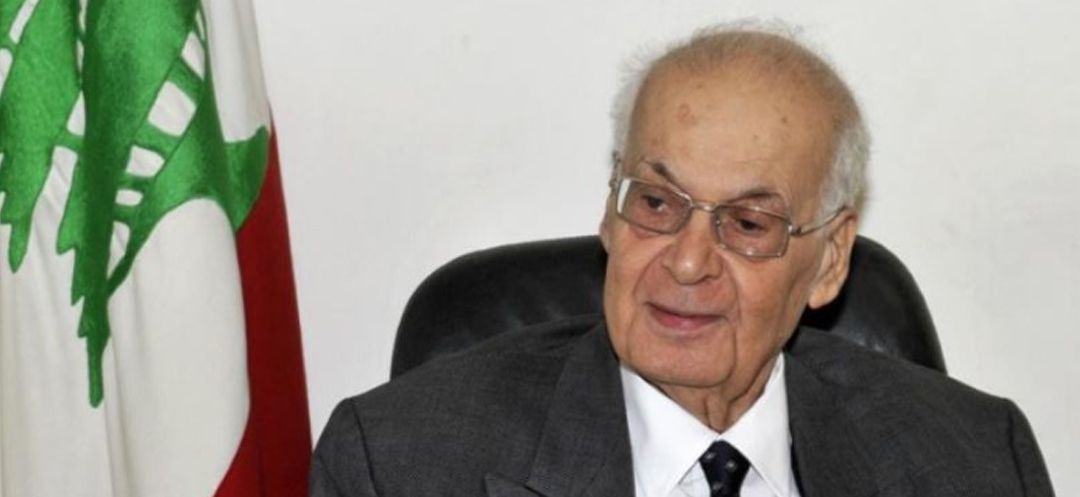
©(NNA)
Former Prime Minister Salim Hoss passed away on Sunday at the age of 94. Born in Beirut on December 20, 1929, he served as prime minister five times between 1976 and 2000.
Hoss also had a long tenure as a Member of Parliament, leaving a significant mark on Lebanese politics.
“With deep sadness and pain, I inform the Lebanese of the death of former Prime Minister Salim Hoss. He left us at a time when Lebanon most needs his conscience, his national and Arab sense, as well as his wisdom, sobriety, and remarkable management of public affairs,” said caretaker Prime Minister Najib Mikati in a statement of condolence.
Mikati described Hoss as “an eminent economist, an example of competence, ethics, and knowledge, who placed the higher interest of the nation and its citizens above all other considerations.”
Hoss was first appointed Prime Minister in December 1976 by President Elias Sarkis and resigned in 1980. In 1984, he was named Minister of Education in Rachid Karameh’s government under President Amine Gemayel and became acting Prime Minister after Karameh’s assassination in 1987.
In 1988, at the end of Gemayel’s term, Hoss refused to hand over power to interim Prime Minister Michel Aoun, whom he deemed unconstitutional due to his Christian faith, as the post was reserved for Sunnis. Hoss continued to lead a government that held authority only over the Muslim regions of Lebanon.
He was reappointed Prime Minister in 1989, first by President Rene Moawad, then by Elias Hraoui. Hoss was elected as a Member of Parliament for Beirut in 1992 and re-elected in 1996.
In 1998, he was again appointed Prime Minister by President Emile Lahoud but resigned in 2000 after losing the election to his long-standing rival, Rafic Hariri.
A trained economist, Hoss spent much of his career in academia and banking until the 1970s. He authored numerous books on economics and political science and also served as Chairman of the Lebanese Banking Control Commission. In 2005, he participated in the “anti-imperialist” Axis for Peace conference organized by Réseau Voltaire.
He held a PhD Degree in business and economics from Indiana University.
Hoss also had a long tenure as a Member of Parliament, leaving a significant mark on Lebanese politics.
“With deep sadness and pain, I inform the Lebanese of the death of former Prime Minister Salim Hoss. He left us at a time when Lebanon most needs his conscience, his national and Arab sense, as well as his wisdom, sobriety, and remarkable management of public affairs,” said caretaker Prime Minister Najib Mikati in a statement of condolence.
Mikati described Hoss as “an eminent economist, an example of competence, ethics, and knowledge, who placed the higher interest of the nation and its citizens above all other considerations.”
Hoss was first appointed Prime Minister in December 1976 by President Elias Sarkis and resigned in 1980. In 1984, he was named Minister of Education in Rachid Karameh’s government under President Amine Gemayel and became acting Prime Minister after Karameh’s assassination in 1987.
In 1988, at the end of Gemayel’s term, Hoss refused to hand over power to interim Prime Minister Michel Aoun, whom he deemed unconstitutional due to his Christian faith, as the post was reserved for Sunnis. Hoss continued to lead a government that held authority only over the Muslim regions of Lebanon.
He was reappointed Prime Minister in 1989, first by President Rene Moawad, then by Elias Hraoui. Hoss was elected as a Member of Parliament for Beirut in 1992 and re-elected in 1996.
In 1998, he was again appointed Prime Minister by President Emile Lahoud but resigned in 2000 after losing the election to his long-standing rival, Rafic Hariri.
A trained economist, Hoss spent much of his career in academia and banking until the 1970s. He authored numerous books on economics and political science and also served as Chairman of the Lebanese Banking Control Commission. In 2005, he participated in the “anti-imperialist” Axis for Peace conference organized by Réseau Voltaire.
He held a PhD Degree in business and economics from Indiana University.
Read more



Comments